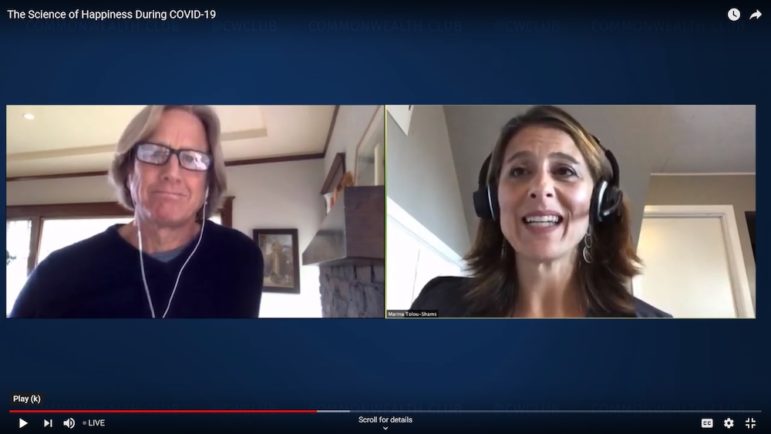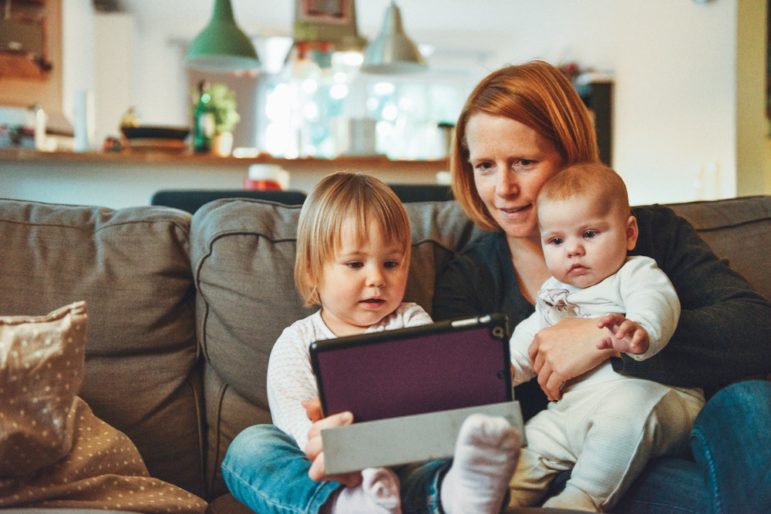Happiness may seem elusive even under ideal circumstances, let alone under current conditions that have brought normal society to a halt.
But happiness is attainable even under the most trying conditions if people learn to take a few moments to find, appreciate and open their mind to it, Dacher Keltner, a UC Berkeley professor and founding director of the Greater Good Science Center, said in an online presentation Tuesday on “The Science of Happiness During COVID-19” hosted by the Commonwealth Club of California.
Keltner offered his insights in conversation with psychiatrist and UC San Francisco professor Marina Tolou-Shams.
“Given there’s so much overwhelm right now, feelings of despondency, hopelessness and that uncertainty,” Tolou-Shams asked, “where does one even start to cultivate happiness in the context of our pandemic crisis?”
The key is “Cultivating a set of practices that can guide us through these tough times,” said Keltner, who has made a study of the science and physical and mental benefits behind happiness.

“When you ask the question of how to cultivate happiness when people are dying and enormous strain is placed on our health care providers and we now know that poor people and people of color are probably going to be disproportionately affected by this, it probably seems like an irrelevant question,” he said. “But in point of fact, I think the science of happiness is more relevant than ever in these hard times.”
He said accumulated research show there are three categories to consider in the pursuit of happiness: Social connection, cultivating positive states or what he likes to call “bursts of awe,” and proven techniques for handling stress such as mindfulness, compassion exercises and breathing exercises.
“And we know if you can find five or 10 minutes a day to practice those things you’ll fare better, all the way down to your immune system,” he said.
Social connection is no less important even with the mandatory social or physical distancing order now in effect to stem the spread of novel coronavirus.
Keltner cited a 2011 study that concluded that a lack of social connection results in 120,000 American lives lost a year.
In the absence of the ability to touch or be in physical proximity “We’ve gotta turn to other modalities, we have to use our voice, we have to laugh, we have to make eye contact, he said. “And then hopefully rely on technologies — we’ll see if they prove to be useful in these times. I think surprisingly so in some ways. Just to remind ourselves how sacred and precious for our bodies social connection is, and there are a lot of ways to go about it.”

Even a five-minute facetime call with someone can be beneficial Tolou-Shams said, noting that the compelling data that, “Even if you can just do a brief intervention, if you can cultivate these brief moments of happiness, the effect that it has on our immune system can really help us cope and stay healthy during this time.”
Keltner responded that “These kinds of things don’t require that you travel to the Himalayas, that you sit cross-legged, that you take two hours out of your day.” He added, “Time and time again what these studies show is that like you say thoughtfully practicing a gratitude exercise or a kindness directly affects your immune system and those of other people.”
That mindset particularly applies at a time when people have the tension of being cooped up together during the shelter order.
“Gratitude is one of the real success stories in the science of happiness, replicated with kids, adults all over the world,” Keltner said, “if you just take a moment to think thoughtfully about what you feel grateful for towards a person, why you feel that feeling you did, what they did to make you feel it, and then express that to the other person. Just a few minutes here and there during the day really matter during these times.”
Tolou-Shams said the challenge for many is “how you even remember to do that when our distress is so high, when you’re trying to figure out how you’re going to pay the rent, how you’re going to buy food, all the fiscal consequences that are occurring or you’re running around taking care of your children while you’re trying to work. I feel like even on the best day it might be hard to put in that one to two minutes.”
Tolou-Shams raised the issue of increased alcohol in many Bay Area households, asking “Is there moderation to cultivating happiness that we should be considering.” Keltner responded that moderation is indeed important, citing Greek philosopher Aristotle that man needs all passions, but needs them in the right way, to the right degree with the right context.
Keltner was also asked about exercises couples can use when things get tense between partners. He said problem areas are excessive criticism, stonewalling, contempt and defensiveness, and advised thinking about counterpoints and capitalizing on the good. One was is to think of “What’s one good thing that happened today” and make that the focus. It’s also a good time for to be forgiving, he said
Keltner acknowledged that there is much greater stress for the underprivileged during the health crisis. “Ultimately, part of what we are all facing is an awareness of what this reveals about our society and if you’re poor it means you might not have enough food right now and how do we handle that,” he said.
African Americans and poor people will be “disproportionately affected” by the crisis, but are also more adept at appreciating coping, Keltner said. “We did a lot of research on privilege and poverty on these practices and you’ll find that (underprivileged) people are more likely to feel awe on a daily basis,” he said. “They practice a little bit more gratitude. So this actually may be a strength that grows out of necessity that we should remind ourselves of.”
Burst of awe and wonder can come by seeking out what one finds inspirational, by appreciating the beauty and wonder to be found outdoors, looking for the silver linings that can be found even in a crisis, he said.
“I think we’ve gone astray in our habits and there’s all this wonder around us and if we can just get back to those roots, a lot of things go in the right direction,” Keltner said. “This emergency or crisis, whatever you want to call it, and our conversation, tells us we need to return to everyday sources of wonder and awe. I, like a lot of people feel like Einstein — ‘Without mystery and awe, there is no science or art.’”

Resources for dealing with anxiety are available at the Greater Good Science Center website, greatergood.berkeley.edu, and guidance on exercises and practices are online at the Greater Good in Action website, ggia.berkeley.edu.
